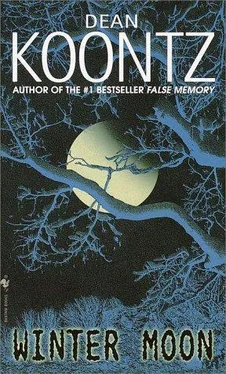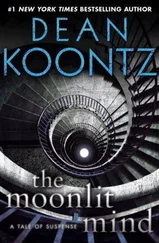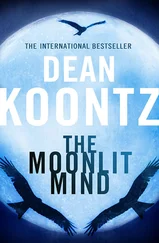Dean Koontz - Winter Moon
Здесь есть возможность читать онлайн «Dean Koontz - Winter Moon» весь текст электронной книги совершенно бесплатно (целиком полную версию без сокращений). В некоторых случаях можно слушать аудио, скачать через торрент в формате fb2 и присутствует краткое содержание. Год выпуска: 2001, ISBN: 2001, Издательство: 2001-01-01, Жанр: Триллер, на английском языке. Описание произведения, (предисловие) а так же отзывы посетителей доступны на портале библиотеки ЛибКат.
- Название:Winter Moon
- Автор:
- Издательство:2001-01-01
- Жанр:
- Год:2001
- ISBN:9780553582932
- Рейтинг книги:3 / 5. Голосов: 1
-
Избранное:Добавить в избранное
- Отзывы:
-
Ваша оценка:
- 60
- 1
- 2
- 3
- 4
- 5
Winter Moon: краткое содержание, описание и аннотация
Предлагаем к чтению аннотацию, описание, краткое содержание или предисловие (зависит от того, что написал сам автор книги «Winter Moon»). Если вы не нашли необходимую информацию о книге — напишите в комментариях, мы постараемся отыскать её.
Connecting both incidents is policeman Jack McGarvey, who is drawn into a terrifying confrontation with something unearthly.
Winter Moon — читать онлайн бесплатно полную книгу (весь текст) целиком
Ниже представлен текст книги, разбитый по страницам. Система сохранения места последней прочитанной страницы, позволяет с удобством читать онлайн бесплатно книгу «Winter Moon», без необходимости каждый раз заново искать на чём Вы остановились. Поставьте закладку, и сможете в любой момент перейти на страницу, на которой закончили чтение.
Интервал:
Закладка:
He wound the scarf around his face, from the chin to just below his eyes.
Although it went around twice, the weave was loose enough to allow him to breathe. He pulled up the hood and tied it under his chin to hold the scarf in place. He felt like a knight girding for battle. Toby watched, nervously chewing his lower lip. Tears shimmered in his eyes, but he strove not to spill them.
Being the little hero, so the boy's tears would be less visible to him and, therefore, less corrosive of his will to leave.
He pulled on his gloves and picked up the Mossberg shotgun. The Colt.45 was holstered at his right hip. The moment had come. Heather appeared stricken. He could hardly bear to look at her. She opened the door. Wailing wind drove snow all the way across the porch and over the threshold. Jack stepped out of the house and reluctantly turned away from everything he loved. He kicked through the powdery snow on the porch. He heard her speak to him one last time-"I love you"-the words distorted by the wind but the meaning unmistakable. At the head of the porch steps he hesitated, turned to her, saw that she had taken one step out of the house, said, "I love you, Heather," then walked down and out into the storm, not sure if she had heard him, not knowing if he would ever speak to her again, ever hold her in his arms, ever see the love in her eyes or the smile that was, to him, worth more than a place in heaven and the salvation of his soul.
The snow in the front yard was knee-deep. He bulled through it. He dared not look back again. Leaving them, he knew, was essential. It was courageous. It was wise, prudent, their best hope of survival.
However, it didn't feel like any of those things. It felt like abandonment.
CHAPTER TWENTY-ONE
Wind hissed at the windows as if it possessed consciousness and was keeping watch on them, thumped and rattled the kitchen door as if testing the lock, shrieked and snuffled along the sides of the house in search of a weakness in their defenses.
Reluctant to put the Uzi down in spite of its weight, Heather stood watch for a while at the north window of the kitchen, then at the west window above the sink. She cocked her head now and then to listen closely to those noises that seemed too purposeful to be just voices of the storm.
At the table, Toby was wearing earphones and playing with a Game Boy.
His body language was different from that which he usually exhibited when involved in an electronic game-no twitching, leaning, rocking from side to side, bouncing in his seat. He was playing only to fill the time.
Falstaff lay in the corner farthest from any window, the warmest spot.in the room. Occasionally he lifted his noble head, sniffing the air or listening, but mostly he lay on his side, staring across the room at floor level, yawning.
Time passed slowly. Heather repeatedly checked the wall clock, certain that at least ten minutes had gone by, only to discover that a mere two minutes had elapsed since she'd last looked. The two-mile walk to Ponderosa Pines would take maybe twenty-five minutes in fair weather.
Jack might require an hour or even an hour and a half in the storm, allowing for the hard slogging through knee-deep snow, detours around the deeper drifts, and the incessant resistance of the gale-force wind.
Once there, he should need half an hour to explain the situation and marshal a rescue team. Less than fifteen minutes would be required for the return trip even if they had to plow open some snowbound stretches of road and driveway. At most he ought to be back in two hours and fifteen minutes, maybe half an hour sooner than that.
The dog yawned. Toby was so still he might have been asleep sitting up. They had turned the thermostat down so they could wear their ski suits and be ready to desert the house without delay if necessary, yet the place was still warm. Her hands and face were cool, but sweat trickled along her spine and down her sides from her underarms. She unzipped her jacket, though it interfered with the hip holster when it hung loose.
When fifteen minutes had passed uneventfully, she began to think their unpredictable adversary would make no move against them. Either it didn't realize they were currently more vulnerable without Jack or it didn't care.
From what Toby had said, it was the very definition of arrogance-never afraid-and might operate always according to its own rhythms, plans, and desires.
Her confidence was beginning to rise-when Toby spoke quietly and not to her.
"No, I don't think so."
Heather stepped away from the window.
He murmured, "Well maybe."
"Toby?" she said.
As if unaware of her, he stared at the Game Boy screen. His fingers weren't moving on the controls. No game was under way: shapes and bold colors swarmed across the miniature monitor, similar to those she had seen twice before.
"Why?" he asked.
She put a hand on his shoulder… "Maybe," he said to the swirling colors on the screen. Always before, responding to this entity, he had said "no." The "maybe" alarmed Heather.
"Could be, maybe," he said.
She took the earphones off him, and he finally looked up at her.
"What're you doing, Toby?"
"Talking," he said in a half-drugged voice.
"What were you saying "maybe" to?"
"To the Giver," he explained.
She remembered that name from her dream, the hateful thing's attempt to portray itself as the source of great relief, peace, and pleasure.
"It's not a giver. That's a lie. It's a taker. You keep saying "no" to it."
Toby stared up at her.
She was shaking. "You understand me, honey?"
He nodded.
She was still not sure he was listening to her. "You keep saying "no," nothing but "no."
"All right."
She threw the Game Boy in the waste can. After a hesitation, she took it out, placed it on the floor, and stomped it under her boot, once, twice. She rammed her heel down on it a third time, although the device was well crunched after two stomps, then once more for good measure, then again just for the hell of it, until she realized she was out of control, taking excess measures against the Game Boy because she couldn't get at the Giver, which was the thing she really wanted to stomp.
For a few seconds she stood there, breathing hard, staring at the plastic debris. She started to stoop to gather up the pieces, then decided to hell with it. She kicked the larger chunks against the wall.
Falstaff had become interested enough to get to his feet. When Heather returned to the window at the sink, the retriever regarded her curiously, then went to the trashed Game Boy and sniffed it as if trying to determine why it had elicited such fury from her.
Beyond the window, nothing had changed. A winddriven avalanche of snow obscured the day almost as thoroughly as a fog rolling off the Pacific could obscure the streets of a California beach town.
She looked at Toby. "You okay?"."Yeah."
"Don't let it in."
"I don't want to."
"Then don't. Be tough. You can do it."
On the counter under the microwave, the radio powered up of its own accord, as if it incorporated an alarm clock set to provide five minutes of music prior to a wake-up buzzer. It was a big multiple-spectrum receiver, the size of two giant-economy-size boxes of cereal, and it pulled in six bands, including domestic AM and FM, however, it was not a clock and could not be programmed to switch itself on at a preselected time. Yet the dial glowed with green light, and strange music issued from the speakers.
The chains of notes and overlapping rhythms were not music, actually, just the essence of music in the sense that a pile of lumber and screws amounted to the essence of a cabinet. She could identify a symphony of instruments-flutes, oboes, clarinets, horns of all kinds, violins, timpani, snare drums-but there was no melody, no identifiable cohesive structure, merely a sense of structure too subtle to quite hear, waves of sound that were sometimes pleasant and sometimes jarringly discordant, now loud, now soft, ebbing and flowing.
Читать дальшеИнтервал:
Закладка:
Похожие книги на «Winter Moon»
Представляем Вашему вниманию похожие книги на «Winter Moon» списком для выбора. Мы отобрали схожую по названию и смыслу литературу в надежде предоставить читателям больше вариантов отыскать новые, интересные, ещё непрочитанные произведения.
Обсуждение, отзывы о книге «Winter Moon» и просто собственные мнения читателей. Оставьте ваши комментарии, напишите, что Вы думаете о произведении, его смысле или главных героях. Укажите что конкретно понравилось, а что нет, и почему Вы так считаете.












